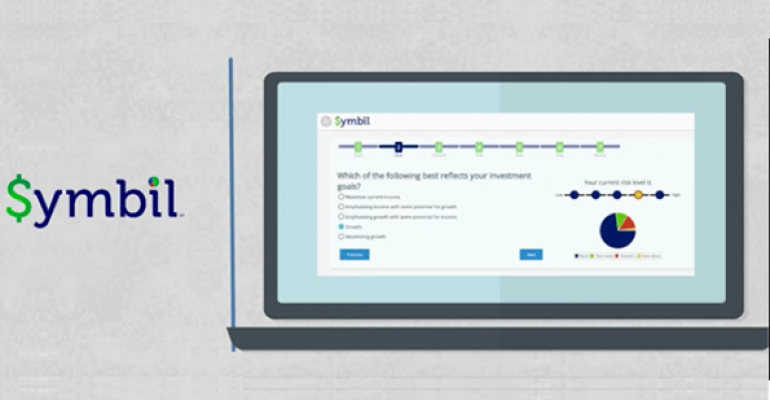As the industry waits for LPL and Commonwealth to reveal their strategy on automated digital financial advice, another broker/dealer’s robo is now ready for the market.
Ladenburg Thalmann Financial Services launched $ymbil, a self-service investment platform that automatically matches clients up with a Ladenburg investment model based on their risk tolerance. $ymbil only requires a minimum investment of $500.
Philip Blancato, the chief executive officer of Ladenburg Thalmann Asset Management, which manages the five portfolio models $ymbil uses, said the product is direct-to-consumer and new clients can fund an account directly through the $ymbil website. But instead of competing with other retail robo services like Wealthfront, Betterment or Schwab Institutional Portfolios, Blancato sees most of $ymbil’s business coming from Ladenburg-affiliated advisors looking to use the service to connect with their current clients’ children and tech-savvy boomers.
“If [advisors] have a millennial client that would prefer to enroll in a digital advice platform, they now have that opportunity,” Blancato said. Though $ymbil doesn’t currently have a white-label offering for advisors, Blancato said the firm is open to providing one in the future if advisors demand it. But “we felt like the way we could build an effective digital advisor would be something that compliments what we already have.”
That “something” is Ladenburg’s 10-year history of working with advisors, making it a brand advisors know and trust more than a technology startup, as well as the company’s philosophy of active portfolio management, Blancato said. So although an algorithm will automatically allocate a client’s assets to a specific model portfolio, those models will be reviewed, and altered, by a team of human investment managers.
“We don’t believe in passive management,” Blancato said, adding that it plans to tweak the five allocation models its robo uses as many as eight times in a year. “We believe tactically adjusting a portfolio will drive higher returns and reduce volatility over the long term.”
In a statement, Blancato said the robo’s portfolios will be managed by a “seasoned investment team that employs strategic asset allocation and tactical decisions to capitalize on market conditions and unique investment opportunities.”
Like with a white-label offering, Ladenburg would consider offering more than five strategies in the future and adjusting how it approaches assigning them to clients. Blancato said this is very much a “version 1.0” of $ymbil and plans for the product to evolve based on advisor feedback.
Timothy Welsh, the president at Nexus Strategy, said it’s interesting that a robo is finally coming into the independent broker/dealer space, a sector Welsh said is slower to adopt technology for fear of cutting out their own reps.
“With the new DOL fiduciary standard, they will need to have a low-cost option for retirement accounts and this will position Ladenburg ahead of the pack when it comes time to comply,” Welsh said, referring to the Department of Labor’s seemingly imminent rule imposing a “best interest” standard on all advisors to retirement accounts, which some argue will drive up the cost of advice for clients with smaller accounts. “It also gives Ladenburg a scalable platform that they can use to drive efficiencies and better enable their reps to charge directly for financial planning advice.”
Joel Bruckenstein, the founder of the T3 conferences, doubted that $ymbil would fly under FINRA’s recent guidelines on digital advice. Bruckenstein said even when he gave conflicting answers on the risk tolerance questionnaire (indicating high risk, but only tolerating a loss of 5 percent), the robo still recommended a growth portfolio.
He also raised doubts about $ymbil only offering Ladenburg funds and the high costs.
“I did not see which class of shares users of this service are invested in, but assuming even people with the minimum investment get the lowest-cost shares, the expenses seem high to me,” Bruckenstein said.
According to Ladenburg, retail investors only pay for the underlying expenses of the fund, which are netted out of performance. The annual fee on operating expenses is 1.23 percent, including the 1 percent management fee and 0.23 percent in underlying ETF expenses. There is no cost for advisors offering $ymbil to clients.
This number is nowhere to be found on $ymbil's website, instead directing customers to the prospectus, where a note on page 13 states that internal expenses to cover fixed costs of the funds are capped at 1 percent.
“Seems like a lot for a little bit of asset allocation guidance. You can get essentially the same thing from a lot of other firms for a fraction of the cost,” Bruckenstein said, even if the fee was only 1.23 percent.
Adam Malamed, chief operating officer at Ladenburg, emphasized that $ymbil is not intended to replace advisors but rather to be a tool to complement their traditional services. And though he thinks Ladenburg’s first-mover advantage in the robo market—at least among other b/ds—is proof of the firm’s ability to remain on the cutting edge of advisor technology, the company built $ymbil with a long-term game plan in mind.
“I hear a lot of industry buzzwords about our competitor firms that are trying to build out their own capabilities,” Malamed said. “Everybody in the industry sees a long-term opportunity. I use the words ‘long term’ understanding that we built this for advisors… not for the next six to 12 months. This is something we’re looking at for five to 10 years.”
Advisors affiliated with Ladenburg can access $ymbil though Ladenburg Wealth Management Advantage, the firm’s suite of advisor resources.





